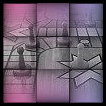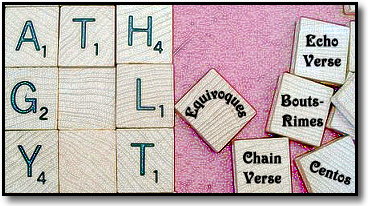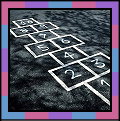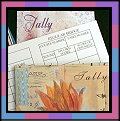
Click here for site NEWS.

Click here to read about the summer's Featured Artists!

Visit the site's Guest page.
|
|
POETRY

According to the Oxford Guide to Word Games by Tony Augarde, in the days when poetry was favored by the leisure classes, people turned their
attention to playing games and tricks with poems. Though some are ancient, the heyday of most of these games was in the 1700s and 1800s. Most of those poetry games
are seldom found now. Each of this summer's poems incorporates a format from one of those games, as defined in Chapter 16, "Playing With Poetry," in Augarde's book (Tony Augarde, The Oxford Guide to Word Games, Oxford/New York: Oxford University
Press, 1984). The titles of the poems and a definition of the form of poetry game used are included below. Click on the pictures or indicated links to go to the poetry pages. ( 2013 NOTE: To view a poem from this year, click on "PLAYERS.")


HOPSCOTCH
Equivoques: Equivoques, of "equivocal verses," were probably a French invention of the 1500s. They are verses which could be read in [at least] two different ways, usually by taking the lines in
two different orders (by reading across or down, reading alternate lines, etc). Click here to go to this poem.

KEEPING SCORE (ON WINNING)
Bouts-Rimes: Bouts-Rimes, or rhymed endings, first became popular in 18th century Britain and in the 19th century was a popular parlour game in which players were required to write stanzas with the rhyming words presented or follow each other
with rhyming lines of verse. An amusing development in the game was to take a line from a well-known poem (preferably the first line) and add a rhyming line that deflated its seriousness. An example: I think that I shall never see . . .
My contact lens fell in my tea. Click here to go to this poem.

PLAYERS
Centos: Cento is the Latin word for a patchwork cloak, and it is applied to a kind of poetry made up of separate lines taken from different poets. Other names for centos are "mosaics" or "patchwork
verses." Click here to go to this poem.

HAVE YOU LOST YOUR MARBLES?
Echo Verse: Echo verse resembles chain verse in its use of repetition (see below). It is verse in which the last word of a line is echoed, often making a completely new word. This creates a dialogue in which the echo comments ironically
on what the speaker says. Though popular in the 1600s and 1700s, echo verses were seldom found in the 19th and 20th centuries. Click here to go to this poem.

THE GAME OF LIFE
Chain Verse: Chain verse, also known as concatenation verse, is a minor form of versifying of the 18th and 19th centuries in which the last word of one line is repeated at the start of the next line. In another form, the last
line of one stanza is used as the first line of the next stanza. Click here to go to this poem.


Home | Essays |
Poetry | Free Concerts | Links | 2011 Extras |
About the Site
Featured Artists | 2011 Website Special Guests | News
|
|
|











